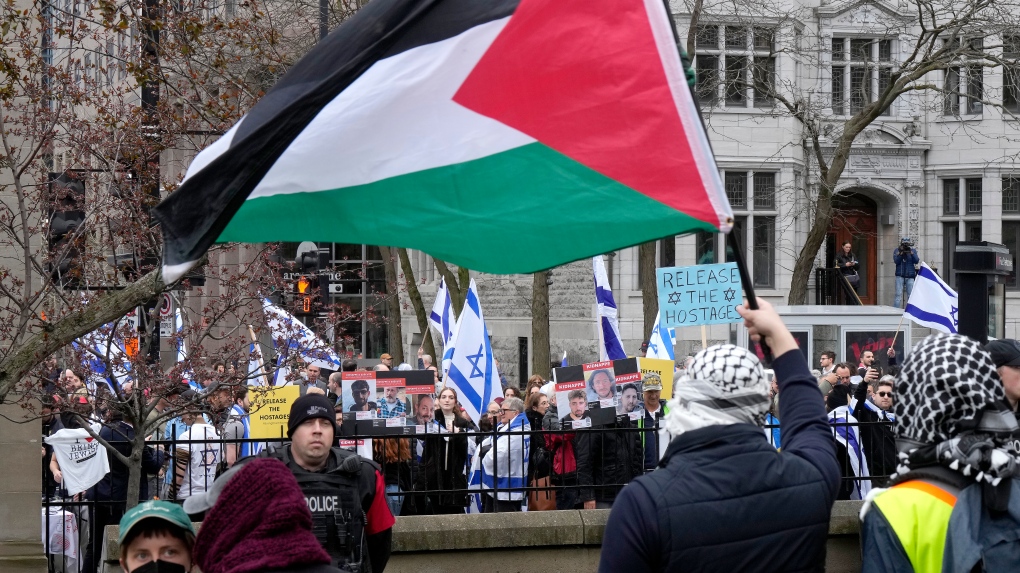Montreal police are facing pressure to move in and dismantle a pro-Palestinian encampment on McGill University campus, as a growing number of universities across this country grapple with the tough decision of how to handle the protests.
"The law must be respected, so I expect police to dismantle these encampments," Quebec Premier Francois Legault said on Thursday.
But university administrators are facing a delicate balancing act as they respond to their concerns about protesters settling in to dozens of tents, while respecting the students’ right to protest, long viewed as a hallmark of university life.
CTV News Quebec Bureau Chief Genevieve Beauchemin spoke to Grace Karram Stephenson, an assistant professor in the Department of Leadership, Higher and Adult Education at the Ontario Institute for Studies.
Read the exchange, which has been edited for length and clarity.
Genevieve Beauchemin: How delicate is it for a university like McGill, at this point, to handle encampments?
Grace Karram Stephenson: In this one, students are finally making specific demands. So it's moved from unrest and students protesting with each other, to students seeing the university as part of the big war machine. So they want them to withdraw their funds from different actors that they see as contributing to a violent armed conflict. And suddenly the students are against the university, and so has it moved from a realm of peaceful protest into a realm of occupation. But can the universities address this without alienating their students? I think that is a really big concern.
 Police separate pro-Palestinian and pro-Israel demonstrators on the outskirts of a protest encampment on the grounds of McGill University, in Montreal, Thursday, May 2, 2024. (Ryan Remiorz / The Canadian Press)
Police separate pro-Palestinian and pro-Israel demonstrators on the outskirts of a protest encampment on the grounds of McGill University, in Montreal, Thursday, May 2, 2024. (Ryan Remiorz / The Canadian Press)
Beauchemin: Is there a way for the university to do that?
Karram Stephenson: For the universities right now, the ones that have gotten ahead of it, the ones that have said, we want to give you guidelines for peaceful protest, but we will take action if there are encampments and occupations, that really is the best method. Because otherwise, as soon as those encampments and occupations happen there are different issues in place. It is private property, even though they're public institutions. And if there is violence against students, if there's damage to property, the institutions are working under a legal framework and they actually have a responsibility to the broader student population.
So at that point, they often do have to take legal action. Security or law enforcement comes in and it's not good for anyone. So on that end, as an administrator, to make sure you're ahead of the student currents, to make sure you're meeting with student leaders, make sure that you've actually had a real listening ear. Students have an incredible ability to sense insincerity. And so if we are not coming to the table actually wanting to hear their demands, they will they will turn to things like encampments and occupations. Now they have a responsibility to not act violently, to not damage property. But institutions are really caught between these two things. And I think it is not easy to be a university administrator.
Beauchemin: How should we interpret, as a society, that students are taking this kind of action?
Karram Stephenson: It is really a movement, right? We see students are caring deeply. They're coming out in large numbers to say what they believe about something. And of course, for us, as professors, this is exciting because we haven't had our classrooms full since COVID. There's a big malaise. So as soon as we see students caring about something, we have to listen. And I really believe our students are the conscience of our country. They are the ones who actually have a little bit less to lose. They don't have the mortgages, the kids, they don't have the jobs yet, the stable jobs. And so they will raise the red flag when the rest of us aren't doing that yet. So if they're calling us to listen right now, we should probably ask ourselves why?






































